Last Updated on April 21, 2023
For much of its existence, the Abakua Society, an Afro-Cuban fraternity with a complicated and fascinating history, has been concealed in mystery.
This secret society was established in Cuba in the late 19th century. But its roots go deeper than Cuba, with origins in West African tradition.
Interestingly, the Abakua Society has kindled the interest of academics and curious onlookers alike thanks to its distinctive initiation system, elaborate rituals, and distinctive language.
If you are also curious and would love to quench your curiosity, join us as we explore this mysterious brotherhood’s origins, rituals, and lasting legacy. Let us take you on a journey through its fascinating past.
The Origins of the Abakua Society
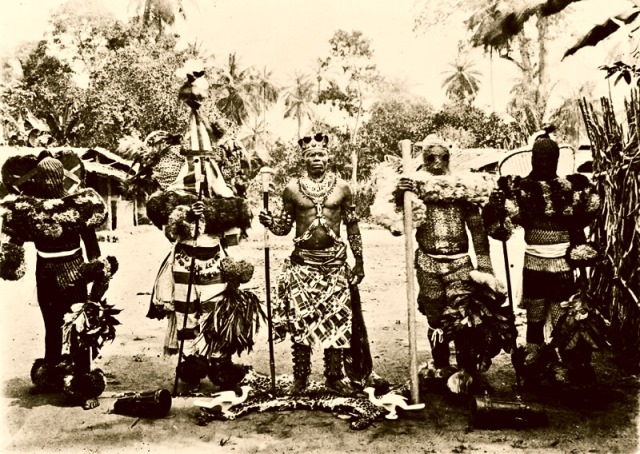
While many of the customs and beliefs of the Abakua Society are still shrouded in mystery, historians have pinpointed their origins to the 19th century and the impact of West African culture on Cuban society.
The society is thought to have been founded in the late 1800s in Havana, Cuba. At the time, Cuba was a Spanish colony and a central transatlantic slave trade hub. It had sizable populations of Africans and Afro-Cubans residing and working there.
The Abakua Society developed in this environment, incorporating the religious and cultural practices of the Efik, Ibibio, and Annang peoples. These groups now constitute present-day southeastern Nigeria.
The founding of the Abakua Society as a covert organization is one of the most critical aspects of its history. The organization’s founding members were reportedly motivated to find a brotherhood by the need to defend themselves from persecution by the Spanish colonial authorities. They were interested in fostering the principles of brotherhood, secrecy, and mutual support.
To date, the society continues to have tightly restricted membership. Rigid guidelines govern who can join and how new members are initiated.
The Abakua Society’s adaptation to the Afro-Cuban cultural environment is a significant aspect of its history.
Cultural Influences
Various cultural influences, such as African, Spanish, and indigenous Cuban traditions, were incorporated into the society’s practices and rituals. For instance, the music and dance of the Abakua Society are thought to have evolved from African rhythms and dances.
These tunes were brought to Cuba by African slaves, but they also feature Spanish flamenco and native Cuban percussion.
The Abakua Society also created a special language and symbol system. This includes a sophisticated system of hand signals and codes, which members use to communicate. In addition, the society adapted the language, called “Ekpe,” for use in Cuba. And it is thought to have also originated in West Africa.
Despite the Abakua Society’s secrecy, the group has significantly influenced Afro-Cuban identity and culture. Its symbols and language have been incorporated into contemporary Cuban art and literature. Its music and dance forms have also influenced various genres, including rumba, son, and salsa.
The Abakua Society has contributed significantly to the development of Afro-Cuban identity. It has created a sense of belonging and community among its members and advocated for preserving African cultural traditions in Cuba.
The Practices of the Abakua Society
Initiation Ritual
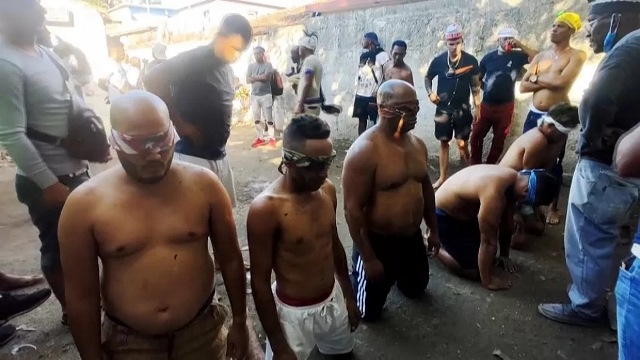
The initiation ritual of the Abakua Society is among its most significant practices. Before being accepted into this society, potential members must undergo demanding tests and trials.
These tests may consist of psychological evaluations to gauge a person’s adherence to society’s values and beliefs. It also includes physical challenges like carrying heavy loads or running long distances.
Loyalty and Secrecy
After becoming a member of this society, one must adhere to their rigid code of loyalty and secrecy.
Members are forbidden from disclosing any information regarding the society’s activities or beliefs to outsiders. And the society’s symbols and language are closely guarded. Violating these laws may lead to expulsion from this society or even physical harm.
Dance and Music
The use of dance and music in the rituals of the Abakua Society is another crucial aspect of their practices. The society’s music is characterized by intricate percussion and rhythms and elaborate dance performances. Plus, the dance is frequently performed in line with the music.
These performances are thought to have evolved over time to incorporate elements of Spanish flamenco and native Cuban music from African traditions brought to Cuba by slaves of African descent.
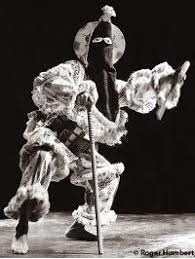
Intricate Costumes
Elaborate costumes and masks are another well-known aspect of the Abakuaociety’s rituals and ceremonies.
During specific ceremonies, members of the society wear elaborate masks and costumes that represent the society’s spiritual ancestors, or “egungun.” These costumes frequently feature intricate patterns and designs and are decorated with materials like animal hides and feathers.
Special Symbols and Language
Lastly, the Abakua Society is renowned for employing a distinctive system of symbols and language. The hand signals and codes used by their members to communicate with one another are closely guarded secrets that they only have access to.
Little is known about the Abakua language because of the society’s secrecy. It is thought to be a creolized version of Ibibio or Efik, both closely related languages or dialects from Nigeria’s Cross River region, the cultural region and ethnic groups where the society originated,
The Legacy of the Abakua Society
Cuban music has benefited from the Abakua Society’s influence, which is one of its most important legacies. Son, rumba, and salsa are just a few Cuban music genres that have adopted the society’s rhythms and percussion.
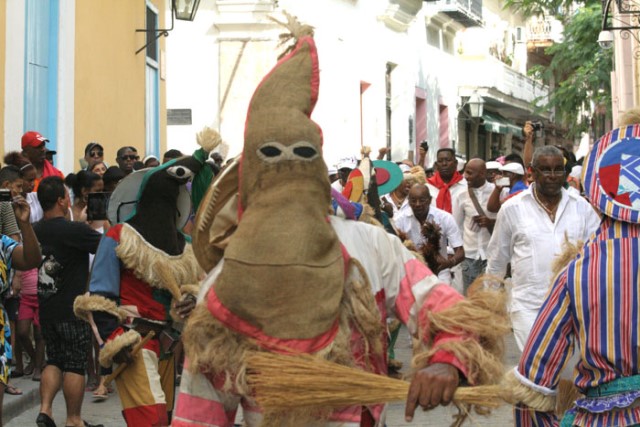
Moreover, musicians who were part of the Abakua Society included Arsenio Rodriguez, Chano Pozo, and Mongo Santamaria, who shared its rhythms and methods with a broader audience. Today, artists like Celia Cruz, Buena Vista Social Club, and Los Van Van produce music that reflects the Abakua influence.
The intricate patterns and designs found in Abakua masks and costumes have influenced artists such as Wilfredo Lam, Roberto Diago, and Manuel Mendive. These artists have used societal symbols and patterns to investigate themes such as identity, spirituality, and resistance.
The Abakua Society not only had a significant impact on music and art but also Afro-Cuban politics and identity. This is evident as the generations of Afro-Cubans have been motivated to defend their identity and fight for their rights by the society’s emphasis on African cultural heritage and resistance to oppression.
Other Afro-Cuban organizations, including the Cabildo de Nacion Arará and the Yoruba Association, have also been influenced by the society’s values of loyalty, secrecy, and solidarity.
However, the Abakua Society has endured criticism and debate despite its contributions to Cuban identity and culture.
Many have questioned the society’s use of African cultural symbols and practices without acknowledging the history of slavery and oppression that brought them to Cuba. Others have accused it of maintaining elitism and exclusionary practices.
Significance of the Abakua Society Afro-Cuban Roots
The Abakua Society is one of many Afro-Cuban customs rooted in the violent and complicated transatlantic slave trade. Its customs and religious beliefs are derived from those of racial groups like the Efik, Ibibio, and Ekoi. These groups were forcibly transported to Cuba as slaves in the 19th century.
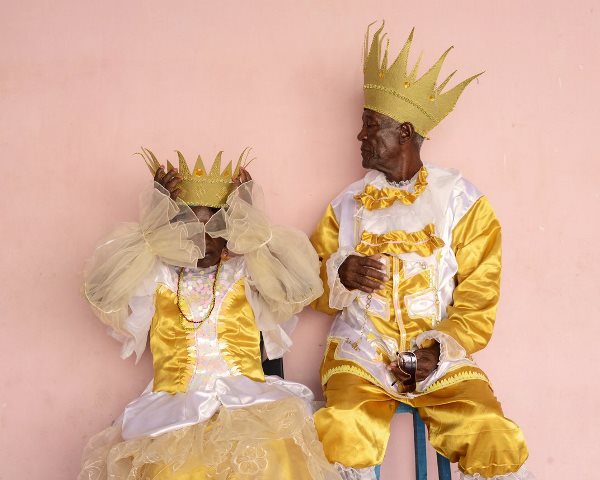
This society allowed enslaved Africans to resist and build a sense of community, especially in such a hostile environment.
It’s commendable to note the society’s strict code of loyalty and secrecy. This has allowed members to develop strong bonds of trust and support. Moreover, its use of dance, music, and costumes gave them a platform to express and celebrate their African cultural heritage.
As conditions for Afro-Cubans in Cuba and its diaspora changed, the Abakua Society has also evolved and made adjustments. While its symbols and dances found their way into Cuban visual art and design, its music and dances rose to popular entertainment.
However, the society’s roots in African culture and resistance have continued to be an essential part of its identity and significance. Its emphasis on loyalty, secrecy, and solidarity evokes memories of the principles of African secret societies. And its use of African musical and cultural elements illustrates the tenacity and ingenuity of Africans who were held as slaves in the face of oppression.
The Abakua Society still plays a significant part in preserving and honoring Afro-Cuban heritage and culture. Its legacy can be seen in the identity politics, music, and art of Cuba and its diaspora. The society has also influenced the ongoing fights for racial justice and equality in both Cuba and the rest of the world.
Future Implications for the Study of Afro-Cuban Traditions
Understanding the history and culture of Cuba and its diaspora, as well as broader discussions of race, identity, and cultural heritage, depends on the study of Afro-Cuban traditions, including the Abakua Society.
By examining how Afro-Cubans have preserved and modified their cultural heritage over time, researchers could help promote recognition and appreciation for Afro-Cuban culture and heritage. This can also shed more light on the tenacity of enslaved Africans and their descendants.
Additionally, a deeper understanding of Afro-Cuban identity’s historical and cultural foundations can guide and support initiatives for Afro-Cubans to achieve greater equality, representation, and recognition in modern Cuban society.
Before you go…
Hey, thank you for reading this blog to the end. I hope it was helpful. Let me tell you a little bit about Nicholas Idoko Technologies. We help businesses and companies build an online presence by developing web, mobile, desktop, and blockchain applications.
We also help aspiring software developers and programmers learn the skills they need to have a successful career. Take your first step to become a programming boss by joining our Learn To Code academy today!











